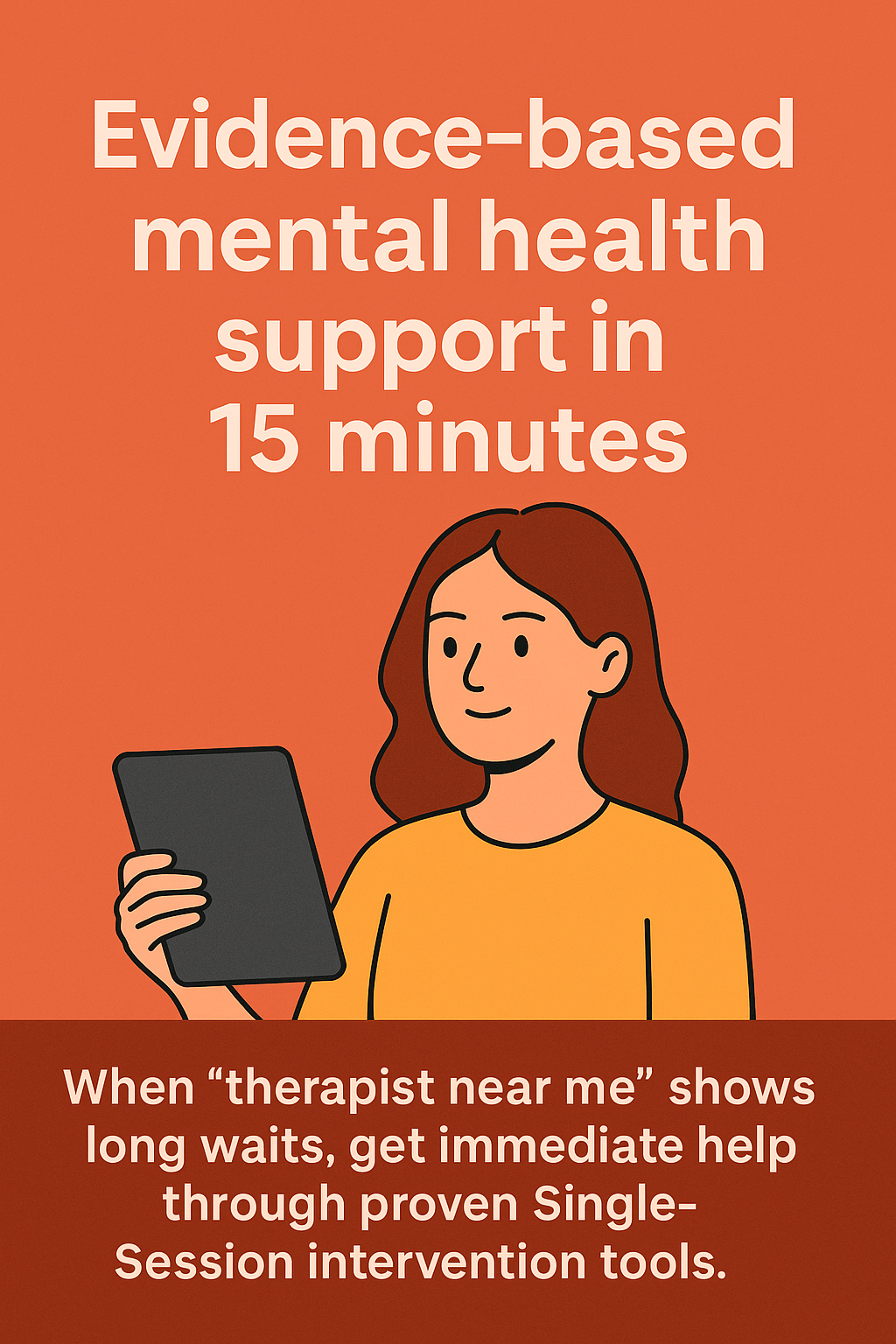Therapist Near Me

"Therapist Near Me": Why Single-Session Interventions Are Your Fastest Path to Mental Health Support
━━━━━━━━━━━━━━━━━━━━━━━━━━━━
The Universal Search That Reveals a Universal Problem
Every month, millions of people type "therapist near me" into search engines. Behind each search is someone ready to take the brave step of seeking help - only to discover a harsh reality: the average wait time for a first therapy appointment is 48 days, with some areas experiencing waits of 3-6 months.
This gap between needing help and getting help isn't just inconvenient - it's potentially dangerous. Research shows that motivation for mental health treatment peaks at the moment of recognition and decreases significantly over time. By the time that appointment finally arrives, many have either given up or reached crisis levels.
━━━━━━━━━━━━━━━━━━━━━━━━━━━━
🚨 The Mental Health Access Crisis: By the Numbers
Current research paints a stark picture:
🔹 65% of U.S. counties have a shortage of mental health professionals
🔹 Average wait time for initial appointment: 48 days
🔹 40% of Americans live in areas with mental health professional shortages
🔹 Only 43% of adults with mental illness received treatment last year
🔹 Cost barrier: Average therapy session costs $100-300 without insurance
━━━━━━━━━━━━━━━━━━━━━━━━━━━━
🎯 Enter Single-Session Interventions: Immediate Evidence-Based Support
While traditional therapy remains valuable for many conditions, research demonstrates that Single-Session Interventions (SSIs) can serve as highly effective first-line mental health support. According to NIH-supported systematic reviews:
✅ 83% of studies show significant positive effects from single sessions
✅ Comparable effect sizes to multi-session treatments for certain conditions
✅ Immediate symptom relief for anxiety, depression, and stress
✅ High satisfaction rates among users
✅ Sustained improvements at follow-up assessments
━━━━━━━━━━━━━━━━━━━━━━━━━━━━
🔬 The Science of "First-Line" Mental Health Support
Research identifies SSIs as particularly effective for:
1. Early Intervention
- Catching mental health concerns before they escalate
- Providing tools at the moment of motivation
- Preventing progression to more severe symptoms
- Building resilience before crisis hits
2. Bridge to Traditional Therapy
Studies show SSIs can:
- Maintain stability while waiting for appointments
- Increase engagement with longer-term treatment
- Provide immediate coping strategies
- Reduce symptom severity before traditional therapy begins
3. Standalone Support for Mild-Moderate Concerns
Research validates SSIs for:
- Adjustment difficulties
- Mild anxiety and depression
- Stress management
- Relationship concerns
- Academic/work performance issues
━━━━━━━━━━━━━━━━━━━━━━━━━━━━
📊 Comparing Access: Traditional Therapy vs. SSIs
| Factor | Traditional "Therapist Near Me" | Single-Session Interventions |
|---|---|---|
| Wait Time | 48+ days average | Immediate access |
| Cost | $100–300/session | $7.99 – 15 minutes |
| Location Barriers | Must be physically “near” | Available anywhere |
| Scheduling | Fixed appointments | 24/7 availability |
| Insurance | Often required | Typically not needed |
| Commitment | Ongoing weekly sessions | One focused session |
🎓 What Research Says About SSI as First-Line Support
Dr. Jessica Schleider's extensive research demonstrates that SSIs can:
- Provide Rapid Relief
- Measurable symptom reduction within days
- Immediate acquisition of coping skills
- Quick wins that build momentum
- Increase Help-Seeking Behavior
- Positive first experience with mental health support
- Reduced stigma through accessible format
- Gateway to additional resources when needed
- Deliver Core Therapeutic Components
- Psychoeducation about mental health
- Evidence-based coping strategies
- Cognitive restructuring techniques
- Behavioral activation tools
━━━━━━━━━━━━━━━━━━━━━━━━━━━━
💡 When SSIs Serve as Ideal First-Line Support
Research indicates SSIs are particularly effective as initial intervention for:
✅ First-time help seekers uncertain about therapy
✅ Mild to moderate symptoms not requiring intensive treatment
✅ Specific, focused concerns (test anxiety, procrastination, conflict)
✅ Prevention-minded individuals building resilience
✅ Crisis prevention while awaiting traditional therapy
✅ Geographic isolation where "near me" yields no results
━━━━━━━━━━━━━━━━━━━━━━━━━━━━
🛡️ The Stepped Care Model: SSIs in Context
Mental health professionals increasingly recognize a "stepped care" approach:
Step 1: Self-Help/SSIs (First Line)
- Immediate access interventions
- Evidence-based digital tools
- Brief, focused support
Step 2: Brief Therapy (If Step 1 insufficient)
- 6-8 session protocols
- Specific issue focus
- Higher intensity
Step 3: Traditional Therapy (For complex needs)
- Ongoing weekly sessions
- Comprehensive treatment
- Multiple issue addressing
Step 4: Intensive Treatment (For severe cases)
- Multiple weekly sessions
- Medication management
- Inpatient/partial programs
━━━━━━━━━━━━━━━━━━━━━━━━━━━━
Research shows that many individuals find sufficient support at Step 1, reducing pressure on an overburdened system while getting help faster.
🚦 Red Flags: When to Skip SSI and Seek Immediate Professional Help
Evidence-based guidelines indicate immediate professional intervention for:
❌ Active suicidal ideation or self-harm
❌ Severe depression or anxiety significantly impairing function
❌ Psychosis or severe mental illness
❌ Substance abuse requiring medical supervision
❌ Complex trauma requiring specialized treatment
❌ Eating disorders with medical complications
━━━━━━━━━━━━━━━━━━━━━━━━━━━━
📱 The Digital Advantage: Why Online SSIs Expand Access
Research on digital mental health interventions shows:
🔹 Equivalent effectiveness to in-person for many conditions
🔹 Reduced barriers for marginalized populations
🔹 Higher engagement among young adults
🔹 24/7 availability matches modern life patterns
🔹 Privacy protection reduces stigma concerns
━━━━━━━━━━━━━━━━━━━━━━━━━━━━
🌟 Real-World Impact: What the Research Shows
Studies of SSI implementation demonstrate:
- Reduced emergency room visits for mental health crises
- Decreased wait times for traditional therapy (by handling mild cases)
- Improved population mental health metrics in areas with SSI access
- Cost savings for healthcare systems
- Higher satisfaction with mental health services overall
━━━━━━━━━━━━━━━━━━━━━━━━━━━━
🎯 Making the Right Choice: SSI vs. Traditional Therapy
Choose SSI as first-line support when:
- You need help today, not in 6 weeks
- Your concerns are mild to moderate
- You want to try evidence-based tools first
- Cost or location are barriers
- You're unsure about committing to ongoing therapy
Seek traditional therapy when:
- You have complex, long-standing issues
- Previous SSIs haven't been sufficient
- You need ongoing support
- Your condition requires specialized treatment
- You're in crisis or danger
━━━━━━━━━━━━━━━━━━━━━━━━━━━━
💪 The Empowerment Factor
Research shows that SSIs as first-line support:
- Build self-efficacy
- Reduce learned helplessness
- Increase internal locus of control
- Develop problem-solving skills
- Create positive help-seeking experiences
━━━━━━━━━━━━━━━━━━━━━━━━━━━━
🔮 The Future of "Therapist Near Me"
As mental health systems evolve, research suggests a future where:
- SSIs become standard first-line support in healthcare systems
- Traditional therapy reserved for complex cases requiring expertise
- Integrated care models seamlessly connect SSI to intensive treatment
- Population mental health improves through accessible early intervention
- "Near me" becomes obsolete as quality care is always within reach
━━━━━━━━━━━━━━━━━━━━━━━━━━━━
🎬 Taking Action: Your First Line of Support Awaits
The next time you search "therapist near me" and face weeks of waiting, remember: evidence-based help is available right now. Single-Session Interventions offer:
- Immediate access to proven techniques
- Research-backed effectiveness
- Tools you can use today
- Bridge support while you wait
- Potential resolution without ongoing treatment
━━━━━━━━━━━━━━━━━━━━━━━━━━━━
The science is clear: for many mental health concerns, the best help isn't necessarily the one physically nearest to you - it's the one you can access when you need it most. And increasingly, that means starting with a Single-Session Intervention that puts evidence-based support at your fingertips, exactly when motivation to change is highest.
Because mental health support shouldn't require a zip code search and a two-month wait. It should be there when you're ready to take that brave first step.
